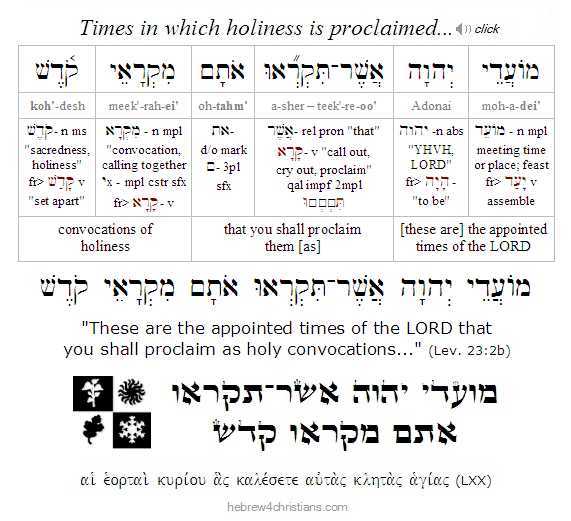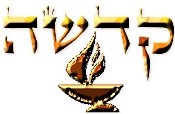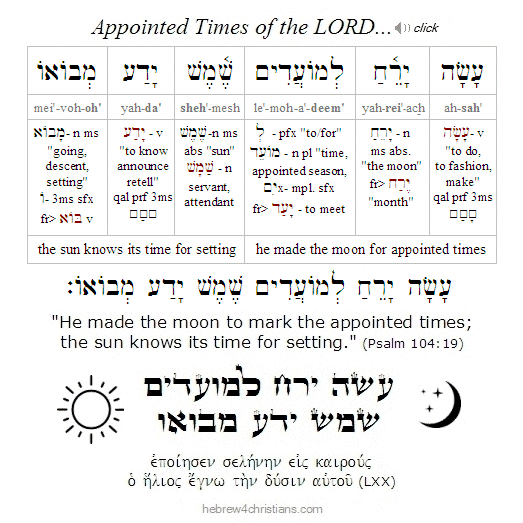|
Our Torah portion this week (i.e., parashat Kedoshim) reveals that the "appointed times" (i.e., mo'edim: מוֹעֲדִים) were given by God to help us turn away from the omnipresent urge within the human heart to embrace vanity: "Every one of you shall revere his mother and his father and guard (שָׁמַר) my Sabbaths (שַׁבְּתתַי)... Do not turn to worthlessness (i.e., אֱלִיל) or make for yourselves any molten gods" (Lev. 19:3-4). In other words, the Biblical holidays - including the weekly Shabbat, the monthly Rosh Chodesh, and so on - were intended to help us to sanctify ("set apart," "make holy") the times and seasons in order to remind us of God's Presence (Psalm 104:19). Therefore they are called mikra'ei kodesh (מִקְרָאֵי קדֶשׁ), "times in which holiness is proclaimed" (Lev. 23:2).
The Torah's declaration that these days are holy implies that they are set apart for special activities, such as celebrating God as our Creator (Shabbat), our Redeemer (Passover), our Resurrection (Bikkurim/Firstfruits), our Lawgiver (Shavuot/Pentecost), our King (Teruah/Rosh Hashanah), our High Priest (Yom Kippur/Day of Atonement), our Shelter (Sukkot/Tabernacles), and so on. In this connection it should be noted that it is a mistake to assume that the divine calendar was somehow abrogated after the cross of Yeshua, since all of the Jewish holidays center on Him, and indeed the advent of the Ruach Ha-Kodesh (Holy Spirit) occured after his resurrection following the 49-day countdown to the jubilee of Shavuot (see Acts 1:8; 2:1-4).
Hebrew Lesson:
Leviticus 23:2b reading (click for audio):
 |
One aspect of holiness is a sense of "separateness" from the prevailing culture. Leviticus Rabbah states that God told Moses, "Tell the Israelites that just as I am separate, so you must be separate; just as I am holy, so you must be holy." Likewise the Apostle Paul taught that we to be "conformed" (σύμμορφος) to the Messiah (Rom. 8:29), but not "conformed" (συσχηματίζω) to the pattern of this fallen world (Rom. 12:2). The former word means to resemble or be made similar in form (μορφή), whereas the latter means to accept the world's scheme (σχῆμα) of understanding things, to passively go along with the world's lies, wishful thinking, fearmongering, propaganda, etc. Of course we need God's help to escape the "programming" of our age, and therefore the Holy Spirit helps us to become transfigured – "changed from the inside out" - by the renewal of our minds, enabling us to see things in light of the reality of our identity in the Messiah.
On the other hand, the duty to walk in personal holiness is not to "opt out" of life in this world by living as a monk or by withdrawing from others as an ascetic, much less having a "holier-than-thou" attitude that prides itself on religious scrupulosity... Yeshua routinely condemned those Pharisees who assumed that the meticulous "laws of purity" intended for the priests during their sacrificial service at the Temple applied to them in their daily life (e.g., some of these Pharisees formed "societies" whose members pledged to eat food only while in a state of ritual purity, to ritually wash their hands, and so on). Yeshua called this the "leaven of the Pharisees" which he said was hypocrisy (Luke 12:1). On the contrary, the Scriptures reveal that holiness is to be lived in the everyday experiences of life, in the context of community. Without humility and love, the practice of holiness is meaningless...
 |
Ultimately our lives "suspended" between two worlds - this phenomenal world with its illusions and the real world of spiritual substance and meaning... We exist in an "already-not-yet" state of expectation and yearning where we must consciously mediate the truth of heaven by bringing it "down to earth." This is a truth war, and by truth I do not mean intellectual knowledge as much as the living truth that marks the lifestyle of a follower of Messiah. We consciously remember Torah truth; we choose to always "set the LORD before us," and we take "every thought captive to the obedience of Messiah..." May God help each of us heed the call to walk in holiness by the power of His love and grace. Amen.
Hebrew Lesson:
Psalm 104:19 reading (click for audio):
|





